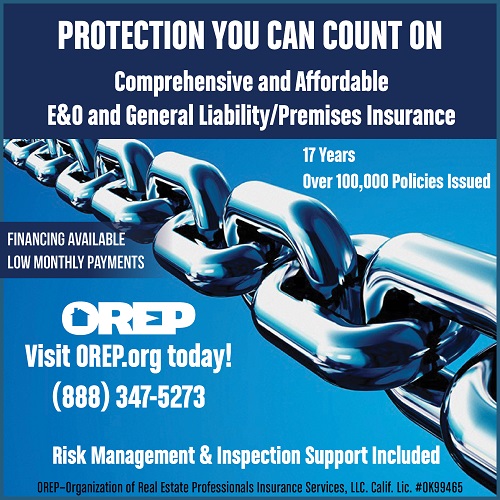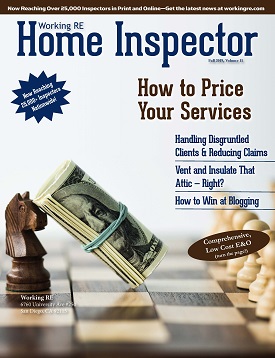 |
> E&O/GL Insurance for Home Inspectors Competitive Rates, Broad Coverage, Free Risk Management, online inspection support for tough questions, discounts on education and more… Professional Coverage, Competitive Pricing Shop OREP today! |
CORRECTION:
Working RE ran this article without first checking with the author and we wanted to make a minor correction and well as acknowledge some things that have changes since this article was originally published as a blog.
- Washington State does not require home inspectors to carry E&O insurance – this is only required if you are a structural pest inspector. If you are a licensed pest inspector in the state, you must carry either E&O insurance or a bond.
- Also, in response to the demand for verbal consultations in the Seattle market, some insurance companies are now insuring home inspectors for verbal consultations as long as the proper contracts have been signed.
Pre-Offer Verbal Consultations
by Dylan Chalk, ScribeWare
With record-low levels of housing inventory, historically low interest rates and swarms of eager buyers in bidding wars over the same house, there is a lot of pressure on home inspectors in the Seattle area, at least, to cut corners.
The problem is, homebuyers have no time and little incentive to complete a thorough home inspection. In the midst of a bidding war, buyers are now forced to get inspections in a short window of time prior to making an offer, and then waiving the inspection contingency on the offer. Despite spending money on home inspections and sewer inspections, a prospective buyer might have only a one in 10 chance of actually getting the house. Some buyers pay for more than five inspections before they get an offer accepted! This creates a strong demand for a less expensive and even more cursory version of a home inspection.
Pre-Offer Inspections
As a home inspector I first encountered the pre-offer inspection in the roaring 2005–2006 market but it was not long before buyers grew weary of paying for complete home inspections on homes for which they were getting outbid. In response to the demands from buyers and real estate professionals, the word pre-inspection started getting lobbed about, often as a word to describe a “pre-offer verbal consultation.” This was not a real home inspection, just a cursory look at the property so that a buyer could waive their inspection contingency without paying for the full inspection fee.
Then the great recession hit, the real estate market tanked, many home inspectors went out of business and the verbal consultation disappeared for a while. At the same time, the state of Washington began a new licensing program for home inspectors. The idea of licensing seemed logical: to insure the public that state-licensed home inspectors would be performing inspections to meet or exceed a set of standards. All home inspections performed in the state should meet these standards and come with a written report. The problem for consumers is that the state law also allows for verbal consultations, and for these types of services, there are virtually no standards.
According to the home inspection licensing law: WAC 308-408- 010, Washington state licensed home inspectors are allowed to do a pre-offer verbal consultation as defined this way: (10) A “Pre-offer consultation” is a verbal report that is limited in scope performed by a licensed home inspector. A pre-inspection agreement must be signed by the client and describe the limited scope of the consultation. This pre-offer consultation is conducted only prior to mutual acceptance.
State law contrasts this pre-offer consultation with a standard home inspection. (14) A “Standard Home Inspection” is a prelisting or presale written report that contains all or most of the components listed in the standards of practice. The components must be listed in the pre-inspection agreement. This standard home inspection report cannot be delivered verbally and must be in writing.
The important thing that homebuyers may not understand is that the state does not define the scope of this pre-offer consultation. The scope of this inspection is defined by the pre-offer consultation contract. It’s unknown what you will receive or what you should expect for your verbal consultation dollars.
Some Real Life Experience
About a year ago, I had the uncomfortable experience of being one of two inspectors inspecting a house for sale at the same time. My fellow inspector was doing a pre-offer verbal consultation for his clients and I was doing a standard home inspection for mine. Both sets of clients were potential buyers. The other inspector informed me that he had been inspecting for over 20 years and proceeded to spend an hour with his clients talking about the house. Meanwhile, I met with my clients and spent almost three times that amount of time inspecting the house.
After he left, his clients were loitering about, measuring and evaluating the house, when they overheard me discussing the abandoned oil tank in the backyard with my clients. (See Figure 1: Oil tank fill valve in the grass.) My client’s wife had a previous experience with buried oil tanks. “She is not going to like this one bit,” my client said rather loudly. When the other buyers overheard his tone of voice they came over and started asking about abandoned oil tanks and my client launched into a horror story about his wife’s $40,000 experience. When their complexion lost a few shades of color it became apparent that they had no idea about buried oil tanks nor that one was lurking in the backyard of the house they were measuring to buy.

Figure 1:
Oil tank fill valve in the grass
I tell this story not to disparage the other home inspector but to point out the discrepancies in what we were paid to do. I was paid to spend two–three hours looking at a house. I was paid to follow 40 years of carefully developed national standards regarding the scope of a home inspection and he was paid to come out and spend an hour looking at the house and talking to his clients. When I hear things like “just check the big stuff,” I become alarmed. That is what a standard home inspection is! The idea that a standard home inspection can be arbitrarily cut in half and still be effective is shortsighted and does not respect the complexity of the houses we are living in. Verbal consultations will lead to more frequent mistakes and confusion, big problems will be overlooked and buyers will feel fleeced. This is inevitable and it is built into the process of a real estate transaction in Washington state by a home inspector licensing law designed to protect consumers!
Are Inspectors Insured for Verbal Consultations?
Most if not all home inspector’s E&O policies do not extend to verbal consultations, according to my insurance agent. Most require a written report to provide coverage—some require a signed inspection agreement to respond. This means, if you burn the house down by accident during a verbal consultation, you are not insured. It also means that the licensing law in Washington State allows home inspectors to perform a scope of inspection service for which they cannot be insured, yet at the same time, the law requires home inspectors to carry insurance! As a response to this, it appears that some inspectors are now doing very cursory reports accompanied by inspection agreements that severely limit the scope of the inspection.
(story continues below)
Inspectors Adjusting to Consumer Demand?
I posted this story in a home inspector chatroom and a fellow inspector made a great point; home inspectors in these hot real estate markets are not performing verbal consultations because they think it is a great idea. Most of us are simply reacting to market demands for our services; the verbal consultation is an effort to help our clients in the midst of house-buying frenzies.
I wish I had a solution to this problem. It is complicated. At the very least, I think it is important that we educate the home buying public that a verbal consultation is not as thorough as a complete home inspection. I have heard that in some states, licensing laws forbid verbal inspections; that is an option to protect consumers but I worry that homebuyers might just forgo the inspection all together.
One place to start would be simply coming up with industry-acceptable vocabulary to better describe the various scopes of services we offer so our clients are a bit more aware of the limitations. As a fellow home inspector so aptly pointed out to me, inspectors in Seattle are constantly being asked to do “pre-inspections” which is vague and frustrating and contributes to the obfuscation of the scope of our various services.
Perhaps we could try to get the following four terms more widely applied in the industry to better describe the various scopes of services home inspectors are offering today.
1. Pre-offer verbal consultation (no report or truncated report to satisfy insurance)
2. Pre-offer inspection (includes report)
3. Home inspection (regular inspection, under contract)
4. Pre-listing inspection (regular inspection for home seller)
I hope this helps start the conversation as to how we can best serve our clients while maintaining a strong reputation among consumers.
Free Risk Management Online Course Claims and Complaints: How to Stay Out of Trouble
Available Now
Presenter: David Brauner, Senior Insurance Broker OREP
David Brauner, Senior Broker at OREP, shares insights and advice gained over 25+ years of providing E&O insurance for inspectors, showing you how to protect yourself and your business. Watch Now!
About the Author
Dylan Chalk is the author of The Confident House Hunter – a book to teach homebuyers how to look at and understand houses: Cedar Fort Press- Dylanchalk.com. He is also the founder of Scribe- Ware LLC inspection report software offering innovative and professional report-writing solutions getscribeware.com and he is the owner of Seattle- based Orca Inspection Services LLC.
Note: The Fall 2019 issue of Working RE Inspector is mailing now to over 25,000 home inspectors nationwide. OREP Insureds enjoy guaranteed delivery of each print magazine and many more benefits.




by Jack Beagle
We are serving Central Missouri and are just getting back into home inspection after serving Denver Metro for many years. Even in Denver where the market stays pretty consistently hot, we never “had” to limit scope and offer verbals to meet the market …however we also never had an inventory shortage. Seems our Midwestern communities are shy about lising their homes coming off the election and pandemic. Our inventory is severely low. Reading your post, though a couple years old brought a lot of perspective. I’d appreciate hearing more on the subject. Thanks for your article.
-by Bud Rozell
Not legal in Texas. Just saying,
-